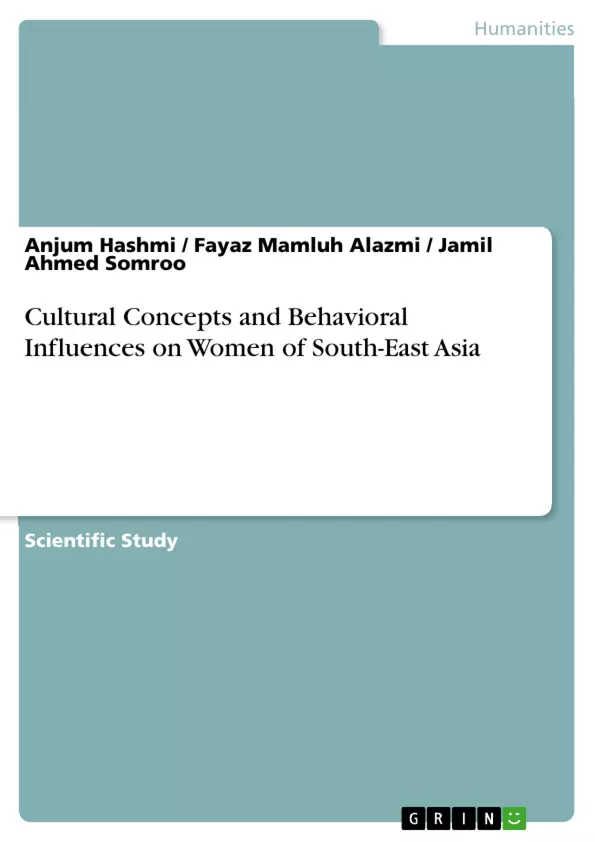This Anthropological study was conducted to understand the link between cultural, social and biological factors with childbearing pattern, health and status of women. The study was conducted in two areas of Lahore, a rural area and an urban slum. Data was collected through observation and repeated in-depth interviews in Urdu/ Punjabi. Forty-six women were interviewed, for triangulation purpose four focus group discussions and eight mother-in-laws were interviewed.
Inhaltsverzeichnis (Table of Contents)
- ABSTRACT:
- CONCLUSIONS:
- INTRODUCTION:
- REVIEW OF THE LITERATURE:
- HISTORICAL BACKGROUND:
- WOMEN IN THE INDO-PAK SUBCONTINENT:
- WOMEN IN ISLAM:
- WOMEN IN PAKISTAN:
- FERTILITY / CHILDBEARING PATTERN AND HEALTH OF WOMEN:
- MATERNAL MORTALITLY:
- NUTRITIONAL DEFICIENCIES:
- REPRODUCTIVE TRACT INFECTIONS AND CANCERS:
- FACTORS AFFECTING THE FERTILITY:
- AGE AT MARRIAGE
- RACE AND ETHNICITY:
- SOCIAL AND CULTURAL FACTORS AND FERTILITY:
- EDUCATION:
- RELIGION AND FERTILITY:
- INCOME AND FERTILITY:
- AIMS AND OBJECTIVES OF THE STUDY:
- AIMS
- GENREAL OBJECTIVES:
- SPECIFIC OBJECTIVES:
- OPERATIONAL DEFINITIONS:
- FERTILITY:
- HEALTH:
- STATUS:
- HYPOTHESES:
- MATERIAL AND METHODS:
- SETTING:
- DURATION OF STUDY:
- SAMPLE SIZE:
- SAMPLING TECHNIQUE:
- SAMPLE SELECTION.
- STUDY DESIGN:
- DATA COLLECTION:
- DATA ANALYSIS:
- RESULTS:
- GENERAL DESCRIPTION AND OBSERVATIONS:
- CHILDBEARING PATTERN AND STATUS OF WOMEN:
- PERCEPTION OF IDEAL FAMILY SIZE:
- SON PREFERENCE:
- CHILDBEARING PATTERN AND RESULTING RESPECT:
- SIPPORT IN THE REGULAR WORK:
- SUPPORTS DURING PREGNANCY DELIVERY AND LACATION.
- ACCESS TO FOOD AND HEALTH CARE:
- DIET DURING PREGNANCY AND LACTATION:
- PERCEPTONS AND USE OF HEALTH CARE DURING ILLINES:
- SUPPORTS DURING ILLNESS:
- PERCEPTIONS AND USE OF HEALTH CARE DURING REPRODUCTION:
- PERCEPTIONS REGARDING HELATY WOMEN:
- THE EFFECT OF CHILDDEARING ON HEALTH:
- DISCUSSION:
Zielsetzung und Themenschwerpunkte (Objectives and Key Themes)
This anthropological study aimed to investigate the relationship between cultural, social, and biological factors and childbearing patterns, health, and the status of women in Lahore, Pakistan. The study explored these factors in both rural and urban slum settings.
- The influence of cultural and social factors on women's health and status in Pakistan.
- The impact of childbearing on women's health, status, and access to resources.
- The role of son preference in shaping women's experiences and opportunities.
- The interplay of socioeconomic status and health care access in rural and urban settings.
- The perceptions and utilization of health care services by women in different socioeconomic contexts.
Zusammenfassung der Kapitel (Chapter Summaries)
The study begins with a comprehensive review of the literature on women's health and fertility in the Indo-Pak subcontinent, focusing on historical, social, cultural, and religious factors. It then outlines the aims and objectives of the study, including its specific focus on the impact of childbearing on women's status and access to resources. The study's methodology is detailed, including the setting, sample size, and data collection methods. The results section presents a detailed analysis of the data collected through observations and interviews, examining the relationship between childbearing, health, and status in both rural and urban settings. The discussion section synthesizes the findings, highlighting the key themes and implications of the study.
Schlüsselwörter (Keywords)
The main keywords and focus topics of this study include childbearing, health, health care, status in the family, family size, son preference, and Pakistan. The study investigates the complex interplay of these factors in shaping the lives and experiences of women in Pakistan.
Frequently Asked Questions
What was the primary goal of the anthropological study in Lahore?
The study aimed to understand the link between cultural, social, and biological factors with childbearing patterns, health, and the social status of women.
Which settings were used for data collection in this study?
Data was collected in two specific areas of Lahore: a rural area and an urban slum.
How does "son preference" affect women in the studied regions?
Son preference significantly shapes women's experiences, their status within the family, and their access to resources and respect.
What methodology was applied for the research?
The research used observation, repeated in-depth interviews in Urdu/Punjabi, and focus group discussions with women and mothers-in-law.
What are the key health concerns for women identified in the literature review?
Key concerns include maternal mortality, nutritional deficiencies, and reproductive tract infections.
- Quote paper
- Anjum Hashmi (Author), Fayaz Mamluh Alazmi (Author), Jamil Ahmed Somroo (Author), 2014, Cultural Concepts and Behavioral Influences on Women of South-East Asia, Munich, GRIN Verlag, https://www.grin.com/document/339548



